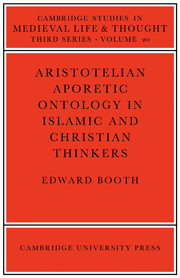Book contents
- Frontmatter
- Contents
- Preface
- Abbreviations
- 1 ARISTOTLE'S APORETIC ONTOLOGY AND THE RADICAL ARISTOTELIAN TRADITION
- 2 THE NEOPLATONIST INTERPRETATION OF ARISTOTLE'S ONTOLOGY
- 3 THE CHRISTIAN ARISTOTELIAN REACTION OF THE SIXTH CENTURY AND MONOTHEIST MODIFICATIONS TO THE NEOPLATONIST LEGACY
- 4 THE ARAB PERIPATETICS: AL-FĀRĀBĪ, IBN SĪNĀ AND IBN RUSHD; AND THE JEWISH PERIPATETICS: ABRAHAM BEN DAVID AND MOSES MAIMONIDES
- STASIMON: THE INTRODUCTION OF THE ‘NEW’ ARISTOTLE AND THE ARAB PERIPATETICS TO MEDIEVAL CHRISTENDOM
- Conclusion
- Appendix
- Bibliography
- Index
4 - THE ARAB PERIPATETICS: AL-FĀRĀBĪ, IBN SĪNĀ AND IBN RUSHD; AND THE JEWISH PERIPATETICS: ABRAHAM BEN DAVID AND MOSES MAIMONIDES
Published online by Cambridge University Press: 05 November 2011
- Frontmatter
- Contents
- Preface
- Abbreviations
- 1 ARISTOTLE'S APORETIC ONTOLOGY AND THE RADICAL ARISTOTELIAN TRADITION
- 2 THE NEOPLATONIST INTERPRETATION OF ARISTOTLE'S ONTOLOGY
- 3 THE CHRISTIAN ARISTOTELIAN REACTION OF THE SIXTH CENTURY AND MONOTHEIST MODIFICATIONS TO THE NEOPLATONIST LEGACY
- 4 THE ARAB PERIPATETICS: AL-FĀRĀBĪ, IBN SĪNĀ AND IBN RUSHD; AND THE JEWISH PERIPATETICS: ABRAHAM BEN DAVID AND MOSES MAIMONIDES
- STASIMON: THE INTRODUCTION OF THE ‘NEW’ ARISTOTLE AND THE ARAB PERIPATETICS TO MEDIEVAL CHRISTENDOM
- Conclusion
- Appendix
- Bibliography
- Index
Summary
The current generalisation about the three greatest Arab philosophers is that with Ibn Rushd there was a return to the original Aristotle, the shedding of ‘Neoplatonist accretions’ found in al-Fārābī and Ibn Sīnā; though sometimes they are more correctly referred to as Aristotelians. Their conception of emanation (fayḍ) alone does not justify the description, particularly when it arose, in part at least, from fidelity to Aristotelian apocrypha. Accepting that they were in the same tradition as himself, Ibn Rushd called his predecessors ‘peripatetics’. Al-Fārābī had made, in fact, a conscious new beginning in philosophy, seeking a more authentic understanding of Aristotle; subsequent Arab tradition, recognising Aristotle as first, named him ‘second master’. The short treatises of al-Kindī he ignored; though the beginnings of Arab Aristotelianism are to be found there.
AL-FĀRĀBĪ
Few of al-Fārābī's (?870–?950) many writings are available in European translation. From the available material, and from secondary studies, it is clear that his fidelity to Aristotle is greater than that of al-Kindī. Whilst it must be admitted that some Neoplatonist themes persist in his writings, for which chronology cannot account, his ontology is unmistakably radical Aristotelian. The authentic Aristotelian themes are rediscovered, as they had been by John Philoponos, after a period of Neoplatonised Aristotelianism. Clarity about Aristotle's real orientation must have come from his study of the Metaphysics.
- Type
- Chapter
- Information
- Publisher: Cambridge University PressPrint publication year: 1983



